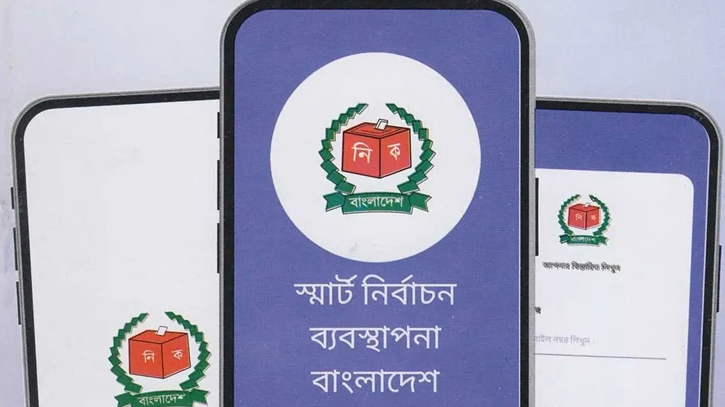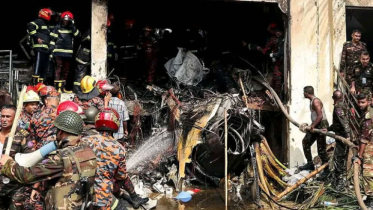
Photo: Collected
As with the national elections, the recent upazila elections have sparked controversy regarding voter turnout. In the national elections, 41 percent of votes were cast. Notably, 27 percent of these votes were cast in the first seven hours, with an additional 14 percent cast in the final hour, raising questions about the integrity of the process. The debate between politics and diplomacy continues to simmer. Meanwhile, the four-phase upazila elections concluded on Wednesday, marked by a record low turnout attributed to allegations of fake votes and sporadic violence. It was also observed that the rate of votes recorded by the Election Commission's voting machines has mysteriously increased in recent times, similar to the trend seen in the twelfth parliamentary elections.
The results of the polls vary significantly while reaching to center, raising numerous questions within the Election Commission (EC) about a 10 percent increase in voter turnout. When media persons questioned the EC about the changing results at several centers, they did not receive satisfactory answers. This has led to scrutiny of the EC's 21 crore taka app, developed to confirm the correct voting rate every two hours and inform the public. The conscious community has raised concerns about whether the app was created to artificially inflate voter numbers. The Online Nomination Submission System (ONSS) and Smart Election Management Apps were launched on November 12 last year, ahead of the national election schedule announcement. Despite promises to release voter turnout data every two hours, the EC failed to provide timely information during both national and local elections. Instead of the promised four updates, the EC only provided information twice. The expected service and priority for these apps have been significantly reduced. Additionally, government party supporters were seen spreading suspicious messages about the EC voting machine through social media, further complicating public trust in the election process.
Analysing two events from the third phase of the upazila elections, discrepancies were noted in the voter turnout reports sent to the Election Commission (EC). Reports from three upazilas of Mymensingh at 4 pm showed a voting rate of 27 percent in Sadar, 25 percent in Muktagacha, and 30 percent in Gouripur. However, the final results announced at night indicated a voting rate of 33.89 percent in Sadar (7 percent more), 32.19 percent in Muktagacha (over 7 percent more), and 41.38 percent in Gouripur (over 11 percent more), according to the EC Secretariat.
Similarly, in the third phase report sent from Chattogram to Dhaka at 4 pm, Boalkhali had an attendance of 38.11 percent, Patia 28.50 percent, Anwara 41.67 percent, and Chandnaish 36.31 percent. However, the final announced results showed Boalkhali at 38.30 percent, Anwara at 42.27 percent, Patia at 31.77 percent, and Chandnaish at 32.32 percent. While Patia and Chandnaish experienced minor variations of three to four percent, the discrepancies in other upazilas were almost negligible.
Asif Nazrul, a professor in the law department at Dhaka University, commented that a party capable of maintaining power through three questionable elections can also manipulate voter numbers. Transparency International Bangladesh (TIB) had previously raised concerns about voter turnout, stating that the rates shown by the Election Commission (EC) apps lack credibility with the public.
EC Secretary Md. Jahangir Alam mentioned that the app faced repeated hacking attempts from Ukraine and Germany, which impacted its performance.
Additional Secretary of the EC office, Ashok Kumar Debnath, acknowledged media complaints regarding discrepancies in vote rates. He stressed that such discrepancies must be investigated, noting that it is the Returning Officer's responsibility to report voter turnout rates. The commission receives attendance rates via the app, but returning officers often fail to update the app correctly due to various reasons.
Lowest voter turnout record in Awal Commission.
The Awal Commission has reported a record low voter turnout in the recent Upazila elections, with figures lower than those in the national elections. In the 12th parliamentary election, where 60 per cent votes were cast, in the upazila election the rate came down to 30 per cent. The Election Commission (EC) claimed a turnout of 36 percent in the first phase, 37 percent in the second phase, 36 percent in the third phase, and 34 percent in the last phase. This means about 64 percent of eligible voters did not participate.
Chief Election Commissioner (CEC) Kazi Habibul Awal reported that 28 people were arrested and 9 punished for various crimes during the final phase of voting. Additionally, voting was suspended in Bhairab Upazila due to ballot box theft, and five individuals were injured in a clash in Barisal. However, the CEC noted that the Electronic Voting Machines (EVMs) performed well.
Badiul Alam Majumdar, secretary of Citizens for Good Governance (Shujan), told the Daily Messenger that the path to democratic power transfer is blocked, leading to voter apathy. The culture of voting is diminishing as people lack confidence in the electoral process, believing that their votes will not be accurately counted. He highlighted the clear bias of the Election Commission, law enforcement, and administration.
Former Cabinet Secretary Ali Imam Majumder echoed this sentiment, stating that public trust in the election system has been severely weakened. The absence of several mainstream parties, including the BNP, from the elections has contributed to the lower voter turnout, as the elections are not seen as genuinely contested.
Messenger/Fameema








